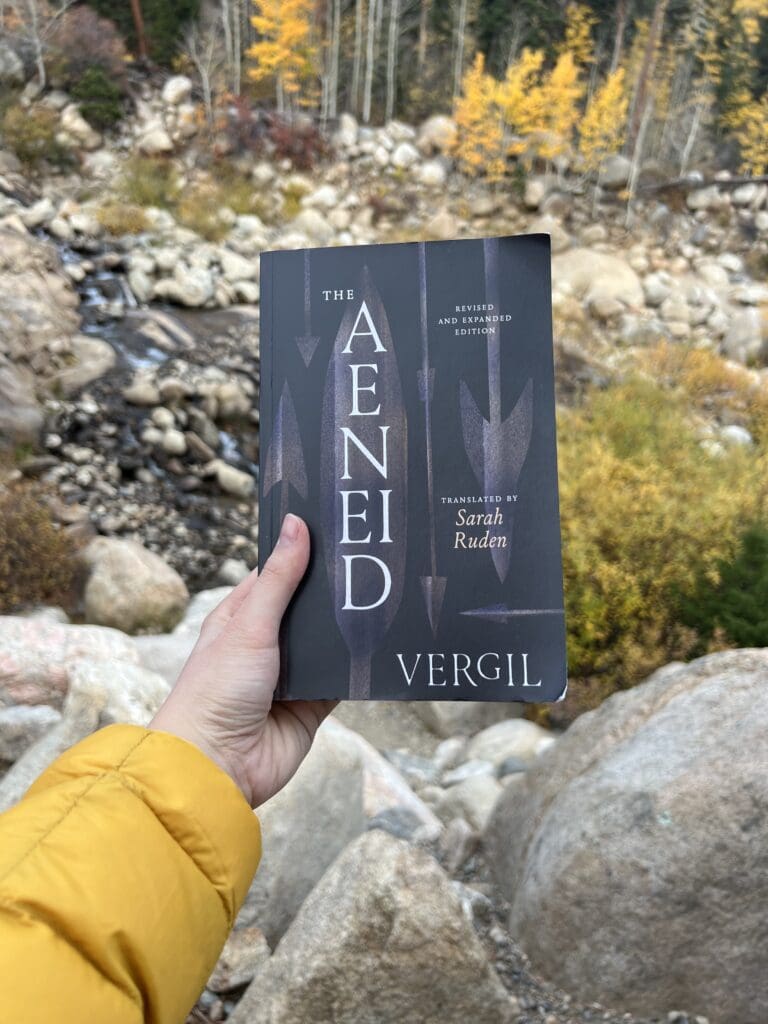Finding Hope in Tragedy: Lessons from Virgil’s Aeneid
Written by Anna Mayer
Seeking a Master’s in Classics, I was hardly surprised to find a class on Virgil’s The Aeneid as a core requirement for the degree. Yet, I must admit that I approached the epic with some level of hesitancy. In my mind, it was one thing to study Plato and Aristotle, yet Virgil and Homer? The looming question was always, what could one hope to gain by studying them? Should a Christian even read pagan classics? The answer is obvious when considered in light of their historical and, arguably, eschatological significance. There is a reason why works like The Aeneid, The Iliad, and The Odyssey have retained their popularity for centuries. They undoubtedly speak into the events occurring at the time while also giving voice to something deeper—perennial truths of the human condition.
Suffering is arguably one of the main themes in The Aeneid, and one would assume that a sense of sorrow is imbued within this suffering. After all, Virgil did not receive the benefit of the incarnation. There was no “redemptive suffering” for the hope of eternity at this point. The gods and goddesses of the Greco-Roman world were often ruthless and vindictive, offering no tangible hope to the mortals they ruled over. Despite this, however, Virgil’s epic is far from hopeless.
Virgil’s protagonist, Aeneas, is depicted from the outset as a heroic figure embodying virtue, bravery, loyalty, and resilience despite tremendous suffering. At the heart of Aeneas’s suffering is his personal loss and the burden of destiny. The fall of Troy, a traumatic and devastating event, is a profound source of anguish for Aeneas and his fellow Trojans. The epic opens with Aeneas lamenting the destruction of his homeland after ten long years in battle against the Greeks. As Aeneas flees the burning city with his father, young son, and few remaining soldiers, he reflects on the deep emotional and psychological scars left by the conflict. This suffering is not merely physical but also existential as Aeneas grapples with the loss of Troy and the “fate” that the gods decreed—to become the founder of Rome.
As the epic continues, Aeneas demonstrates incredible virtue and heroism against almost insurmountable odds. With the goddess Juno attempting to thwart his every move, Aeneas strives constantly to hold on to hope. There are touching moments fraught with grief and sorrow, but Aeneas remains constant.
While The Aeneid is rooted in Roman paganism, it is not without eschatological significance through which the Christian reader can examine his own spiritual narratives. Virgil sensed something deeper than simply the rule of the Roman gods and goddesses. There is something of Aristotle’s “unmoved Mover” in Virgil’s philosophy—something greater than man, greater than the gods even—that gives meaning to suffering, sacrifice, and redemption. With this understanding, Aeneas’ journey, marked as it was with tragedy and trials, finds deeper meaning that resonates with readers even today: This world is not the end. There is joy in tragedy, hope in despair, and redemption in suffering. Thus, we read the “pagan classics” not only to discover our history but also to find deeper meaning in our own lives.


Anna Mayer
Anna is a St. Thomas alumni, currently working on her Master’s in Classics from Memoria College. She is a stay at home mom to four beautiful but busy babies, a 3 year old, 2 year old, 1 year old and 2 month old baby. She is a lover of books and all things literary. And coffee. Lots of coffee. Anna and her family live in Crosby, MN.
About Well-Read Mom
In Well-Read Mom, women read more and read well. Our hope is to deepen the awareness of meaning hidden in each woman’s daily life. We long to elevate the cultural conversation and revitalize reading literature from books. If you would like us to help you select worthy reading material, we invite you to join and read along. We are better together! For information on how to start or join a Well-Read Mom group visit our website wellreadmom.com

